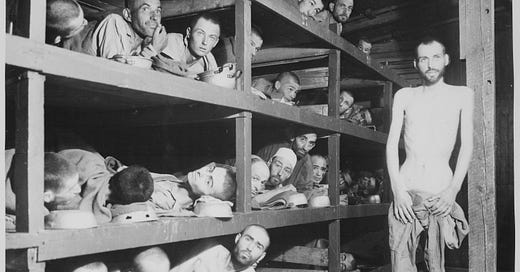Elie Wiesel
Let’s workshop this poem about the impact a woman feels after recognizing a beloved author among the emaciated bodies in a concentration-camp photo.
Elie Wiesel
Photos of campers too skeletal
to seem happy on liberation day
surely crossed her eyes
over the years, but terror
impaled her only after spotting
a name she knew, of a man—
a number sunken like the rest—
with the inner life to write
the novels that molded her.
This poem is unpublished
Photo: dp.la/primary-source-sets/elie-wiesel-s-night-and-the-holocaust/sources/1546






Safe Space Report.--
This poem depicts the impact of witnessing photographs of emaciated concentration camp survivors. Initially, the narrator acknowledges the haunting images but does not fully comprehend their significance. However, upon recognizing a familiar name among the survivors, a profound sense of terror takes hold. The name belongs to a man whose inner life, expressed through his novels, has deeply influenced the narrator's own life and identity. The poem highlights the transformative power of personal connections and the lasting effects of traumatic experiences.
This might all sound nice, but clearly it is too activating for college classrooms. First, it talks about a traumatic subject: the holocaust. Second, and more importantly (almost as if by malicious design), the author releases this "liberation day" story on Juneteenth. His message seems to be to take the spotlight away from black folx. Black folx, however, face a daily barrage of white supremacism, which has been growing in strength to heights it has never seen (invisible heights now that whitey is so clever) over the last five years. Can't they get some time in the sun (that does not involve them picking cotton). Jeez.
This author needs to be silenced. Why are lynchings always used for evil?